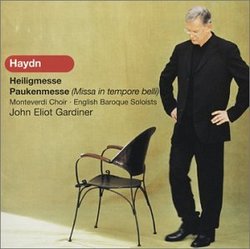| All Artists: Franz Joseph Haydn, John Eliot Gardiner, English Baroque Soloists, Angharad Gruffydd Jones, Joanne Lunn, Topi Lehtipuu Title: Haydn: Heiligmesse; Paukenmesse Members Wishing: 0 Total Copies: 0 Label: Philips Import Release Date: 4/2/2003 Album Type: Import Genre: Classical Styles: Opera & Classical Vocal, Chamber Music, Historical Periods, Classical (c.1770-1830) Number of Discs: 1 SwapaCD Credits: 1 UPCs: 028947081920, 002894708192 |
Search - Franz Joseph Haydn, John Eliot Gardiner, English Baroque Soloists :: Haydn: Heiligmesse; Paukenmesse
 | Franz Joseph Haydn, John Eliot Gardiner, English Baroque Soloists Haydn: Heiligmesse; Paukenmesse Genre: Classical
This pairing of the Heiligmesse and the Paukenmesse, both composed in 1796, is a fine idea. The Paukenmesse, also known as the "Mass in Time of War" was composed when the Napoleonic War was at its peak; Haydn's wild use of... more » |
Larger Image |

 Track Listings (23) - Disc #1
Track Listings (23) - Disc #1